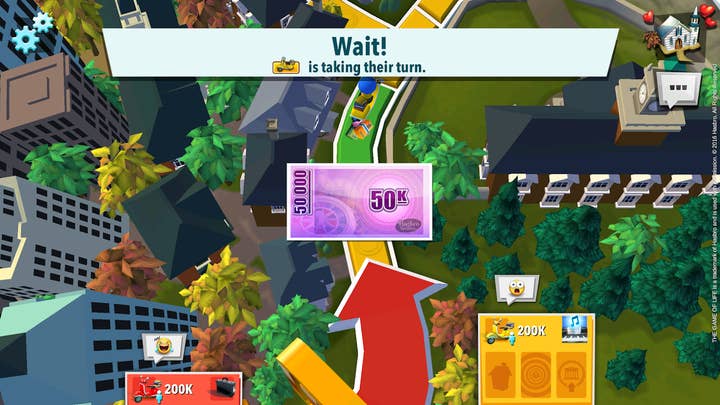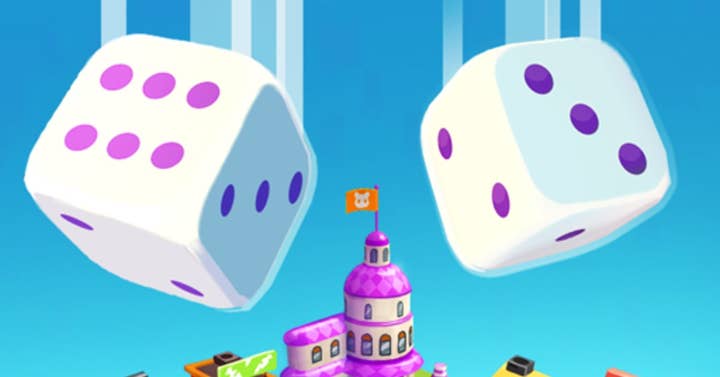The mobile board game market is growing, and ripe for disruption | Opinion
The physical board game boom has been raging for years but hasn't had the slightest repercussions on mobile (yet)
Physical board games give players exactly what they can't get over the Internet: the shared pot of tea, a real friend who is socially bound to finish the game, the reaction of a brother having lost a third time in a row. Obviously, these are things that can't be transferred to a mobile device.
For the scope of this article, board games will mean multiplayer, strategic, often turn-based games played on a board with pawns or meeples and sometimes with dice or cards. Dice only or card only games will not be discussed. Games with board game elements, but with another dominant genre, will also be ignored.
Such board games rank lowly compared with the games in almost all other game categories in the top free and top grossing lists of the app stores. What are the reasons for this? Are board games particularly difficult to adapt to mobile devices? Why are so few classic or modern board games successful on mobile phones? Why haven't more original, made-for-mobile board games come up?
RPGs can sell more lethal swords. But a chess game in which an additional queen can be bought would never find an audience
Still, many board games should also find an audience online. A fan of a specific game will promptly find a game partner on the Internet at three o'clock in the morning. A father might want to train online to be fit for the family board game session the next weekend. It's certainly faster and cheaper to try out an acclaimed board game online than to buy the physical original.
But mobile devices aren't computers: they are mobile, being used while going from one location to the other, the user being subject to noise and multiple diversions. Mobile screens are small and less immersive than computer screens, making it more likely that players should be distracted. Even when interacting with a mobile phone at home, users will switch it off readily for any reason and ditch it on the bedside table.
These behaviour patterns are difficult to reconcile with the essential characteristics of many board games. Strategic thinking requires time and calm. The shortest sessions will be interrupted by a player receiving a call. A game will be forfeited because a player waiting for his turn taps on an ad and switches to another game.
Today's mobile games have been shaped by these features and have in turn developed standards that mobile players unconsciously expect from them. Mobile puzzle games have win ratios of above 80%, but board games will always tend to a win ratio of 50% when equally skilled players are matched. Even when playing against a bot in a mobile board game, a high win ratio often doesn't really feel right.
Difficulty to monetize mobile board games with IAP and ads
More importantly for developers, board games seem to be difficult to adapt to the two main mobile game monetization models: in-app-purchases and advertising.
It's acceptable for an RPG to sell more lethal swords or additional supporting pets. However, a chess game in which the last two turns can be cancelled or an additional queen can be bought would never find an audience. There are some board games with a chance element that use pay-to-win mechanics: Scrabble GO players can swap their tiles against new ones without their opponent noticing it. But these are exceptions and in-app-purchases affecting the game outcome are perforce being used sparingly in mobile board games.

Developers might also find out that mobile board games are less compatible with advertising than many other mobile game genres. A turn-based board game shouldn't encourage players waiting for their turn to tap on ads, thus forfeiting the game and ruining everyone's game experience. Deep strategic thinkers will be bitterly annoyed by intrusive ads and will entirely ignore non-intrusive ones. Ads might not perform as well in such a context and will generate lower income.
Mobile adaptations of classic board games
Classic board games reflect these monetization hurdles. Chess is the most played game in the offline and online world, but chess websites are only monetizing with a mix of donations, paid-for VIP modules or paid-for tutorials. Moreover, chess is difficult to play on mobile devices: on the one hand, it requires intense concentration and on the other hand, the controls are inadequate for bullet chess. Only Chess.com seems to be generating sizeable revenues as a mobile app.
The learning curve for board games is steep compared to match-three or hypercasual games: the drop off rates are high, consequently also the cost per loyal user
Backgammon is easier to monetize. On the one hand, it's a betting game -- the die with the square two sequence -- and the virtual betting currency can be sold to players. On the other hand, there is a chance element in Backgammon and the concentration required to play the game is much lower than for chess.
One of the most successful classic board games on mobile devices is Ludo, also known as Sorry in the British Isles. There are usually five Ludo games in the top ten Indian board game leaderboards in the App Store and on Google Play. The pool of players is so big that they all generate substantial revenues only with ads and vanity in-app-purchases. However, the main reason Ludo is successful on mobile devices is that it's a chance game and that it can casually be played while doing something else.
Developers might be tempted to think that barriers to entry for classic mobile board games are low: the rules, the basic elements, the key words and the advertising slots are the same for everyone. However, incumbents benefited from first mover advantages and network effects and have since built rich, retention oriented meta-games. Today, it would require high development and marketing budgets to compete against them.
Mobile adaptations of modern board games
Modern board games are protected by trademark and copyright legislation. Mobile game developers buy licenses from physical board game distributors to gain an advantage over competitors releasing similar games. The established brand and its well-known visual elements reduce their advertising costs.
This might at first look like a sound business model: securing a license for a particular game, developing it for mobile devices, launching the mobile version first to the existing audience with little marketing expense and thereafter expanding this audience with targeted user acquisition. Surely, a successful physical board game must have an attractive gameplay that should also be marketable online?

But user acquisition for mobile applications is competitive. The learning curve for board games is steep compared to match-three or hypercasual games: the drop off rates are high, consequently also the cost per loyal user. This is also the case for many strategy or role playing games, the difference being that they monetize heavily with pay-to-win items, something board games can't do as bluntly. It's therefore challenging to expand the audience of physical board games online. Moreover, except for the biggest franchises, the online and mobile player pools tend to remain small. This makes it difficult to match players in real time, more so if the board game requires players to be matched according to their skill levels. Existing players will leave the game and new loyal players will be even more difficult to attract.
The mobile version of modern board games have ended up eschewing competition with free-to-play mobile games altogether and are mostly sold as premium games relying on search ads to be found by their existing offline fans. This is the case even for Monopoly and The Game of Life. Risk: Global Dominion and Catan Universe are notable exceptions.
Developers should generally be careful when considering securing the mobile adaptation rights of a board game franchise. They will have to pay an advance on future royalties upfront and will be subject to seemingly arbitrary guidelines that often prevent revenue maximisation. Moreover, a well-known franchise might provide a marketing advantage, but it won't eliminate gameplay copycats: while there is the officially licensed Scrabble Go, it's competing with Zynga's hugely popular Words With Friends games.
Original board games for mobile devices
An alternative to adapting classic and modern board games to mobile devices is to create board games specifically for mobile devices. Sid Meier's Civilization was launched on PC, felt like a complex single-player board game and catered to board game players eager to play board games on PC. Similarly, new and original mobile board games could cater to board game players eager to play board games on their mobile devices.
The success of Board Kings and Words With Friends suggests that there is an audience that wants to play board games on smart devices
Word games like Wordscapes are offering new game mechanics that didn't exist in the physical world and aren't as successful on computers. However, they don't involve any strategic thinking and mostly avoid player versus player confrontation. They are single-player puzzle games with leaderboards based on friends from Facebook.
Board Kings is a polished, original and addictive mobile game. It borrows many elements from Monopoly and manages to look like a board game... while still falling short of feeling like one. Again, it doesn't offer any strategic gameplay and players never confront each other; they visit each other's boards, a bit like players of farming simulation games visit other players' farms. Still, the game is successful and its creators don't lose sleep over whether it's a board game or not. Its success does nonetheless suggest that a sizeable number of mobile users want to play board games on their mobile devices.
Board games with a new, original gameplay face the same problem as other mobile games with a new, original gameplay: new players will download the game not knowing what it's about and only a fraction of them will eventually like it and play on. For all original games, the drop off rate in the user acquisition funnel and the cost per loyal user are high. However, for board games, these high advertising costs come with limited monetization potential.
The territory conquest game FILD Renegade Monsters was first launched as a player versus player mobile board game. When it couldn't build up big enough a pool of players for players to find systematically and swiftly online opponents, the game was relaunched as a single-player board game, in which players face increasingly stronger bot opponents. The win ratio was raised to a level mobile users are familiar with.
#
High level suggestions for mobile board games
Board games aren't the most natural fit for the mobile device medium, to put it mildly. However, there are a few good reasons to develop mobile board games: the success of Board Kings and other board game-style mobile titles like Words With Friends suggests that there is an audience that wants to play board games on smart devices; the development costs of mobile board games are relatively low; and board games can be used to advertise other and better monetizing strategy games in a post-IDFA world.
Strong developers control the mobile space for the most popular classic board games and for the successful and mass-market modern board games. Today, it very much looks as if only original board games, made specifically for the mobile device medium, have a chance to succeed on mobile devices.
Such original mobile board games must abide by the laws and customs of mobile devices. If they aim at making money, they must be free-to-play and be appealing to a huge potential player pool.
The prospect of a new mobile-centric board also poses a number of interesting design challenges. Players must be able to pick up intuitively a small set of simple rules. The gameplay must have a strong chance element and mustn't generate high complexity. The turns must be quick and the games not last for more than a couple of minutes. New players should start with fighting weak bots and face a smooth difficulty rank up. Player versus player should only be introduced once the player pool is big enough for fast and consistent matchmaking.
The result would be a board game where luck is more important than strategy and social interaction remains fairly casual, but given the success of board game-like app, the potential is certainly there.
Nicolas Weber-Krebs is the CEO of Bisbog SA, a mobile game developer based in Lausanne, Switzerland and creator of FILD Renegade Monsters.
